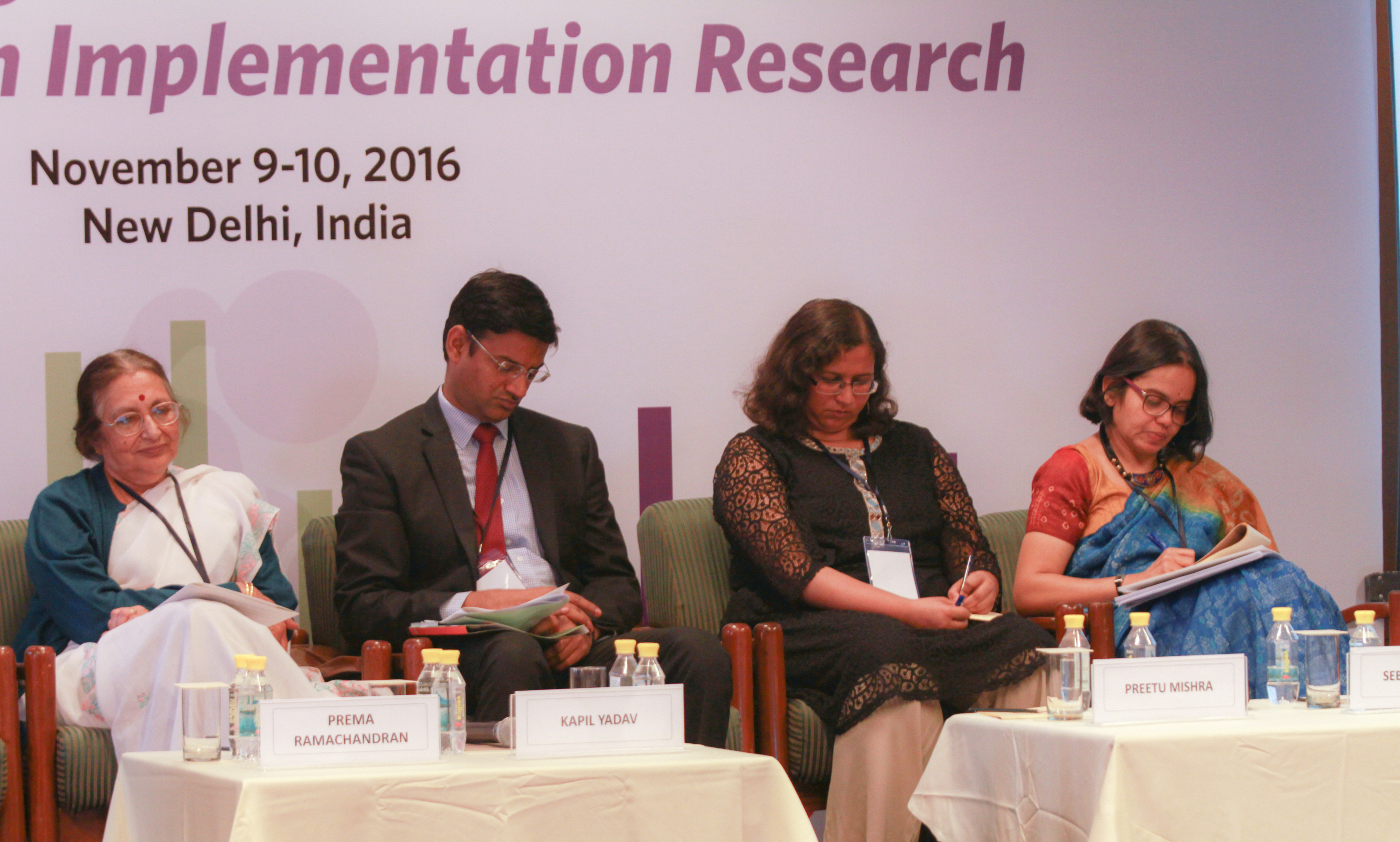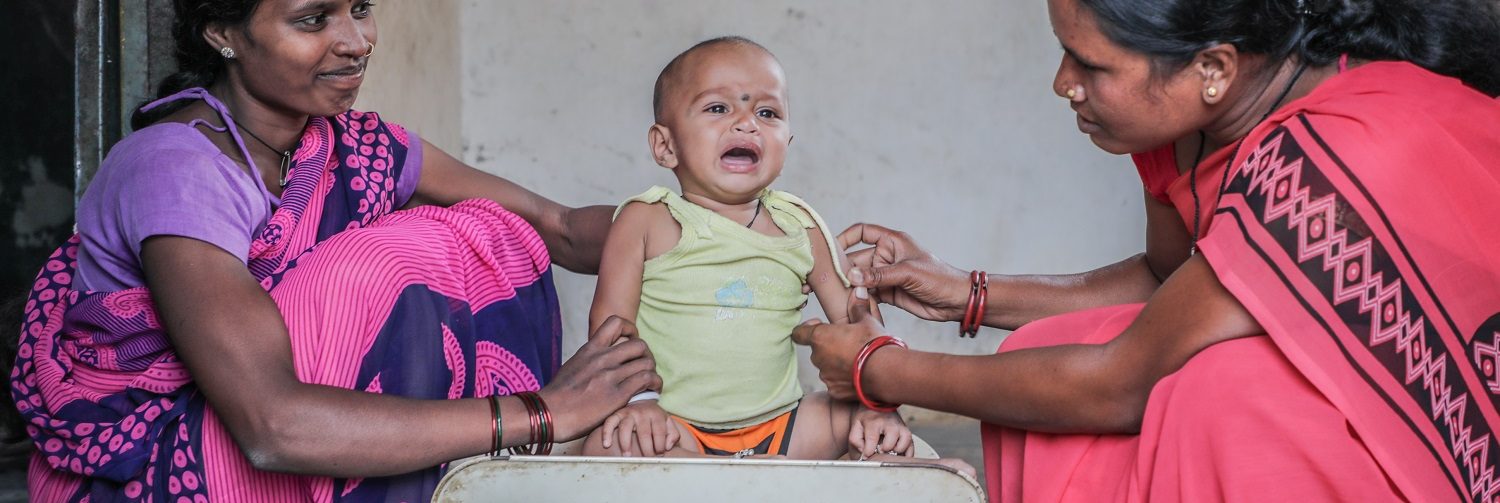 Delivering nutrition interventions during the period between pre-pregnancy and lactation is crucial for ensuring optimal maternal and newborn health. With this in mind, two sessions of POSHAN’s “Delivering for Nutrition: Learnings from Implementation Research” conference (November 9–10, 2016) were exclusively dedicated to implementation research on the delivery of interventions from pre-pregnancy through lactation. Chaired by Prema Ramachandran from the Nutrition Foundation of India and Kapil Yadav from the All India Institute of Medical Science, the sessions featured presentations on the Adolescent Girls’ Anemia Control Programme, maternal diet diversity and its impact on children, the impact of weekly home visits and antenatal care and counseling on IFA receipt among pregnant women, and the impact of peer counselling and other interventions on IYCF practices.
Delivering nutrition interventions during the period between pre-pregnancy and lactation is crucial for ensuring optimal maternal and newborn health. With this in mind, two sessions of POSHAN’s “Delivering for Nutrition: Learnings from Implementation Research” conference (November 9–10, 2016) were exclusively dedicated to implementation research on the delivery of interventions from pre-pregnancy through lactation. Chaired by Prema Ramachandran from the Nutrition Foundation of India and Kapil Yadav from the All India Institute of Medical Science, the sessions featured presentations on the Adolescent Girls’ Anemia Control Programme, maternal diet diversity and its impact on children, the impact of weekly home visits and antenatal care and counseling on IFA receipt among pregnant women, and the impact of peer counselling and other interventions on IYCF practices.
Preetu Mishra from UNICEF shared experiences from the Adolescent Girls’ Anemia Control Programme, a programme that aims to control anemia among adolescent girls in five states. The programme formed the basis of the Weekly Iron and Folic Acid Supplementation (WIFS) programme that was launched by the Ministry of Health and Family Welfare (MoHFW) in 2012. Ms. Mishra highlighted the factors that led to effective implementation of the programme. These included techno-managerial units at the state level, partnerships with academic/training institutes for capacity building, and the prevention of supply stockouts.
Two presentations focused on maternal diet diversity and its impact on child health outcomes. Sebanti Ghosh shared results from Alive and Thrive’s research on maternal nutrition practices in Bihar and Uttar Pradesh. She identified current practices and barriers and potential use of existing platforms to increase support, and concluded that factors which facilitated maternal nutrition practices are counseling, awareness about effect of maternal health on child health, and support of family members in the intake of nutrients. Similarly, Sirazul Sahariah, shared results from a randomized control trials conducted by the Centre for Study of Social Change in Mumbai, reiterating that improving women’s diets preconceptionally and after gestation leads to only a modest increase in birthweights.
Farhad Ahamed from AIIMS and Amanda Wendt from the University of Heidelberg shared observations on the impact of different interventions on the receipt of iron and folic acid (IFA) tablets among pregnant women. Dr. Ahamed found that, in Haryana, weekly home visits and supervision of IFA intake led to higher uptake of IFA among pregnant women. Dr. Wendt’s research found that ANC and counseling measures were able to increase IFA uptake among pregnant women in rural Bihar.
Shubhra Mittal presented findings from two formative studies of JPAL in Tamil Nadu. She spoke about the Muthulakshmi Reddy Maternity Benefit Scheme in Tamil Nadu that provided beneficiaries with extra income to purchase nutritious food and compensate for their wage loss. She also emphasized that breastfeeding outcomes could be improved if better information delivery could be designed.
The session concluded with two presentations on two different studies aimed at improving infant and young child feeding (IYCF) practices in Uttar Pradesh. Dr. Arun Gupta from BPNI spoke about how skilled counselling through home visits improved infant and young child feeding practices in Lalitpur, yet another powerful presentation. Dr. Laili Irani from Population Council presented early findings of an evaluation conducted on impact of using women’s self-help groups (SHGs) to improve nutrition in Uttar Pradesh. The focus of the intervention was on IFA consumption, early and exclusive breastfeeding and complementary feeding. She highlighted the need for reinforcing the messages delivered through the SHGs, to further improve women’s knowledge on nutrition.
Overall, these sessions highlighted the richness of available evidence on the impact of improving intervention coverage. Given the large number of essential nutrition interventions, much more evidence is needed on this topic across India
Written by Tarana Chauhan, IFPRI.
Related resources:
POSHAN Research Note: A Review of Evidence-Based Interventions in Indian Nutrition Programs
POSHAN Implementation Note: Using Participatory Learning and Action to Empower Women’s Groups to Improve Feeding Practices in Madhya Pradesh
POSHAN Report: Delivering for Nutrition in Odisha: Insights from a Study on the State of Essential Nutrition Interventions
POSHAN Report: Delivering for Nutrition in Madhya Pradesh: Insights from a Study on the State of Essential Nutrition Interventions


